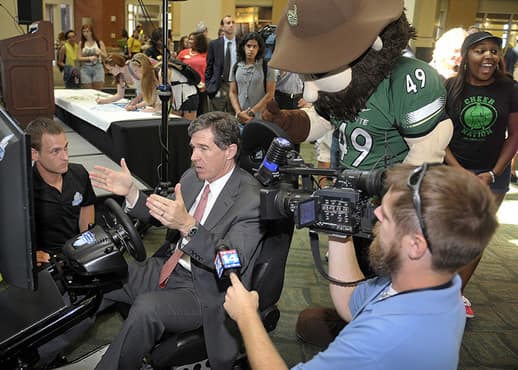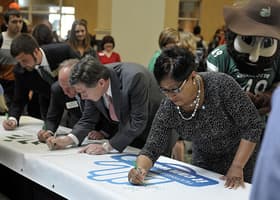
Members of the University community got a realistic look at what can happen when people text while behind the wheel of an automobile as AT&T brought its driving simulator to campus Wednesday, Sept. 4.
North Carolina Attorney General Roy Cooper, Chancellor Philip L. Dubois and AT&T executives, students and others experienced firsthand the dangers of texting behind the wheel. The driving simulator – a video game that included a chair, steering wheel, pedals and a monitor – was set up in the busy rotunda of the Student Union from 10 a.m. until 2 p.m.
Drivers got a taste of a 3-D driving simulation that involved a city of about eight blocks and realistic texts that appear on a smart phone accompanying the chair. This re-creates the eyes-of-the-road and hands-off-the-wheel experience of texting while driving.
Sophomore Max Perless, 19, who is a public health sciences major, was the first to try the simulator. He found himself weaving in and out of the lane and ended up getting pulled over by a police officer.
“I couldn’t even read the texts that were coming in on the cell phone,” he said. “I didn’t even try to reply and look what happened.”
 After signing a pledge to not text and drive, Perless said he planned to have a serious conversation with his father.
After signing a pledge to not text and drive, Perless said he planned to have a serious conversation with his father.
“My dad is a busy mortgage banker, and he can’t resist checking his phone for emails every time he’s in the car,” he said. “I’m concerned about him.”
At a news conference, Dubois said he was proud to announce UNC Charlotte is the first North Carolina university to join the “It Can Wait” movement, signing on as an advocate alongside other state organizations that include the North Carolina Driver and Traffic Safety Education Association, the North Carolina Department of Transportation and the Carolina Panthers.
"At UNC Charlotte, we are committed to making a lasting difference in our students' lives and serving our community," he said. "Usually we focus on academic achievement, personal growth, and setting goals for the future, but nothing is more important than student safety. So I am excited about a program that saves lives, here in North Carolina and across the country."
Cooper held up his own cell phone as he stressed the importance of putting it down while in the car.
"Texting while driving is unnecessary, illegal, and most of all, dangerous for you and everyone else on the road," he said. "Let's join together and commit never to text while driving."
Launched four years ago by AT&T, the “It Can Wait” campaign now includes more than 200 advocates nationwide, and it continues to gain momentum as consumers increasingly come to understand the risks which accompany texting while driving.
“At AT&T, we want to send the message that texting while driving is just as unacceptable as drinking and driving,” said Venessa Harrison, president of AT&T-North Carolina.
According to the National Safety Council, texting drivers cause more than 100,000 automobile crashes resulting in death or serious injury every year. Drivers who text or email while behind the wheel are 23 times more likely to be in a crash than are those who keep their concentration on the road.